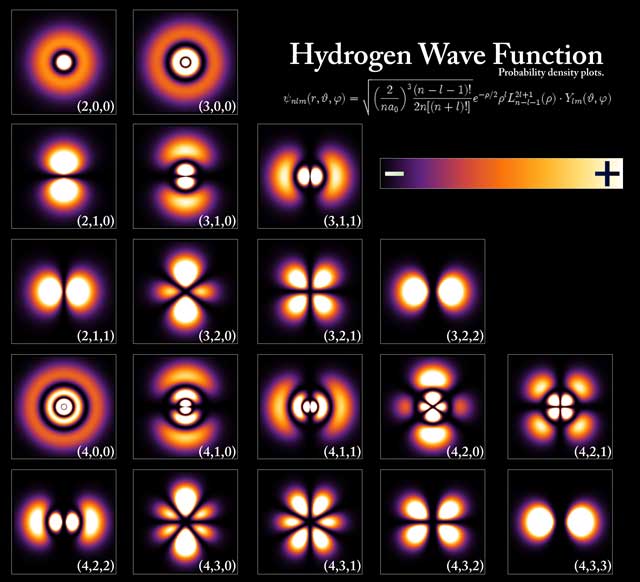Prove me wrong, I dare you!
They are. Solar systems make up galaxies, which make up clusters, which make up super clusters, which make up galaxy filaments the largest known structures in the universe. Each one of these recursions make the one before it seem infinitesimally small.
So they must all form something… right? What is that something?
The universe… which might actually be the inside of a giant black hole. Turns out the observable universe contains more than enough mass to create a black hole the size of the observable universe. This would also make sense because the Big Bang started as a singularity of infinite density, and what’s at the center of a black hole? A singularity of infinite density. This also would jive with the recent developments around the holographic universe theory because black holes have been shown to store all contained information holographically (basically all of the information is encoded on the 2d surface of the event horizon).
The theory that our universe is inside a black hole isn’t new, nor is it accepted as fact by the whole scientific community, but it is a genuine possibility. Then begs the question, is there another universe outside this black hole, and are there universes inside the black holes in our universe? It might be an infinite self contained loop of infinite universes.
Please note that all of this is way oversimplified.
I guess that could also explain why we’re only able to move in time in one direction? As in, time being the fourth dimension along which we are being pulled into that black hole of the higher, four-dimensional universe, with three-dimensional “surface” of the event horizon? Would that make any sense?
our universe… which is one of the multiverses… i hope i got what you’re looking for?
deleted by creator
It’s called a galaxy
Okay, so what if galaxies are synonymous to atoms in that they are the building blocks of something greater?
insert something here about protons, neutrons, electrons, quarks etc. being comparable to solar systems and planets.
Galaxies form galactic groups and clusters. Clusters can form into super clusters. Beyond that, you’re looking at the universe itself as the next large collection of stuff.
As above, so below
And beyond, I imagine
Likely beside as well.
As within so without
They are. They’re gravitationally bound into galaxies in much the same way that atoms are electromagnetically bound into molecules. These galaxies then group into clusters and strands, not too different from messy cobweb. Which molecules can do too.
You could probably keep going. The universe is basically a sponge. It’s not like, super poetic or anything. It’s just a sponge. I mean, unless sponges have some poetic metaphor I’m unfamiliar with.
Sponges suck up all the juices.
The burden of proof lies with the one making the claim. But cool thought though!
I haven’t been able to let this thought go since it first entered my mind years ago, but I have no means of providing evidence. The scale of our universe does not allow a lowly person like me to provide evidence for such theories :(
I like to think of it like fractals
The timescales for things would be wacky since there’s the speed of light as a maximum. Stars would decay way too fast for those timescales needed for normal distances of travel even at the speed of light
Who says constants and physics laws would be the same in that enormois system? Quantum physics show dkfferent behavior for things inside an atom compared to objects of our size
You mean like this?
Maybe, but afaik you can’t put atoms into a bag like that. Im not a chemist, but as I understand it atoms interact with other atoms to form elements.
In my thought experiment, universes would behave similar to atoms….
This is getting too detailed for a shower thought!
You are thinking of a gross oversimplification what atoms look like.
They aren’t “solar systems” like this
They are clouds of probabilities like this

Atoms and celestial bodies also work by completely different forces.
At least one reasonable answer. I mean, what does the question even mean?
I’d say there’s no “what if”. We can already know that they both are and are not building blocks of something greater.
What are atoms building blocks of? Nothing. Combining atoms to form a parsley doesn’t actually make anything new. Nothing emerges from combining atoms. There is no “parsley”, there’s just atoms.
Similarly solar systems form galaxies, they form galaxy clusters etc. But a galaxy is nothing but a collection of solar systems etc.
However, the direction of causation is not only from small to big. The big also influences the small, and actually also determines it. For example the position and movement of the small is influenced by the big. Its position and movement is what the small actually is, as being in a different place or moving differently it would be something else that what it is now. You can’t separate a thing’s position from what that thing is. And more fundamentally, a thing is its interactions with other things. Outside of its effects on other things, you can’t observe a thing, and those effects are the only existence of that thing.
In that sense you could say that atoms and solar systems are not building blocks of bigger things, as there are no fundamental building blocks and no things that are built either. There is just a network of things, none of which exist as independent things other than mutually determining and being determined by the network.
all of this has happened before, and all of this will happen again
There’s actually a Dutch website dedicated to this theory: http://home.kpn.nl/wegge168/Frame-engels.html
I could not ask for more.
These out-of-pocket theory websites are the best.
Remember the Time Cube?
I think I’ve seen this Simpsons couch gag.
Shrooms?
The biggest issue with this idea is the speed of light. Atoms participate in a lot of interactions because subatomic particles act nearly instantaneously. There are millions of interactions occurring within a single proton at any given moment, with various virtual particles annihilating one another. Even if you increased the time scale, space is extremely large and there just wouldn’t be a lot happening in a solar system. There would be slight perturbations in orbits, and the sun would go through cycles quickly, but it’s extremely stable when compared to an atom.
Then if you look on a galaxy-wide perspective, the actions within the solar system are irrelevant to most of the galaxy. It would take a hundred thousand years for even the sun burning out to register, and more than likely it wouldn’t even matter for any other solar systems in our area.
Then if you look beyond galaxies, it’s mostly just the intergalactic medium being siphoned one way or the other, with only the random movement of galaxies determining anything.
Atoms have the weak and strong nuclear forces, as well as electromagnetism to create the complexity of the universe. Solar systems have little else but gravity, constrained by incredible distances even on the scale of the speed of light.
I think galaxies may fit the quantum atomic model better. Each galaxy as an individual building block, the nucleus being the supermassive black hole at the core, and the equivalent of electrons as a cloud around it.












